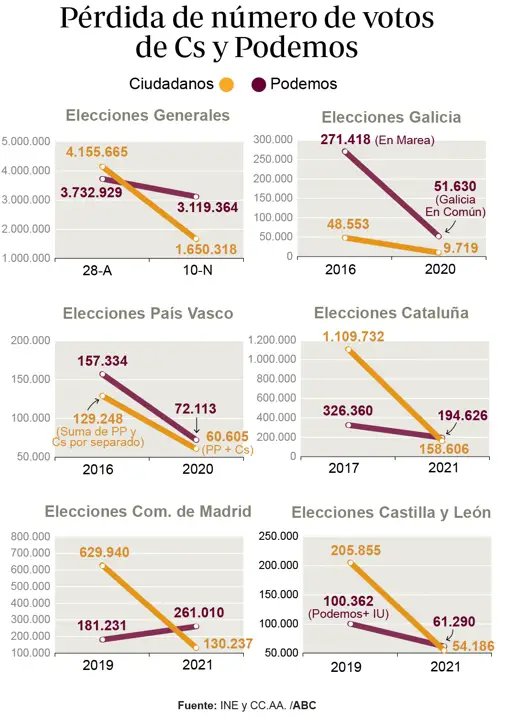![]() CONTINUE
CONTINUE
Read here the case of Ciudadanos]
This is the story of a party come to less; and here are the data. From 2015 to 2016, Podemos lost a million voters in the repetition of the general elections (it coincides here that they went from running alone to going in coalition with the United Left). In April 2019, the flight of voters went further: they fell to 3.732.929.
With the repetition of November, that same year, they emporan it: 3.119.364. The collapse is a fact. In representation in Congress: from 71 to 35 deputies in four years. And the ruin expands at the regional level; in the last electoral cycle they lost support in (almost) all of Spain.
United We Can enter the coalition government with its worst historical result, but with the hope of reversing the precipitous fall through "progressive policies". No. From 2019 to today, two issues are demonstrated: the decline of Podemos is not prevented by Pablo Iglesias becoming the second vice president of a coalition Executive with the PSOE, and neither does he save anyone by abandoning politics, already converted into a solvent rather than mobilizer. "I no longer contribute to adding," he said in his goodbye.
Castilla y León, the farewell
In 2019, in Castilla y León, Podemos and Izquierda Unida added 68.787 and 31.575 votes, respectively, and presented themselves for separation. This February 13, in coalition, they lost one of their two prosecutors and obtained 61.290 ballots. Which means that together they were voted for less than the separate purple party three years earlier.

They were also harmed by the participation of the Soria ¡YA! and Union of Pueblo Leones (UPL). "It is a reality that we have had a setback," admitted the candidate Pablo Fernández, at the time spokesman for the Podemos Executive. And he not only referred to the results in his community, but also responded when asked about the general fall.
The issue is that since they came to the Government until the advancement of Castilla y León, comedians were held in four autonomous communities and in all of them they admitted having to do "self-criticism" after some negative results compared to the previous ones. In 2020, we will disappear from the Galician Parliament. A hard knock. From having 271.418 votes and 14 deputies under the umbrella of En Marea to collecting only 51.630 with the acronym Galicia in Common, a handful that is not attributed to resist with representation.
The Basque Country held the same elections in 2020 and all the same losers could: from 157.334 votes to 72.113, support that translates into a fagot of 11 to 6 seats. Regarding the Catalan elections of February 2021, Podemos and En Comú Podem say they are "satisfied" because they kept their eight seats in Parliament. However, the loss of votes there is unquestionable: from 326.360 to 194.626. In these three territories there is the circumstance that as Podemos loses weight, the left-wing regionalist and nationalist alternative gains it; See BNG, Bildu and ERC.
Planting of the new project
Iglesias appeared last year in the elections in the Community of Madrid to try to stop this trend and avoid a regional government of the PP. They came from having suffered in the capital with the appearance of More Country and the polls announced that they could disappear. Iglesias launched and improved the results: from 181.231 votes to 261.010, from 7 votes to 10. But he was unable to stop the right and resigned. The data from the other regional polls in 2019 are also negative. Except Andalusia, where they went with another number and stamp, today dynamited.
But this 13-F noted the difficulties of Podemos to recover a brand that was dying. They were the first elections without churches (that was the solution, wasn't it? Make way for new leaders...), and neither the labor reform nor the increase in the SMI to a thousand euros announced a few days after dedicating himself to being a catalyst. This script made it easier for the second vice president, Yolanda Díaz, to plant her new project, but that weakness also affected her because of one leg of it. The configuration “listening process” will start at the end of March or beginning of April.
The day after the elections, the vice president suggested it on Twitter. As a post-election reflection, Díaz called for a "new country project", considering the United We Can cycle closed: "Citizens who want changes (...) We just have to look at the right place and live up to it." He only attended a campaign event in which, by the way, he did not have any decision-making power.
Podemos understands that his future consists of being part of his candidacy. But the tension for the greatest possible protagonism pits the management against the vice president, who does not have organic positions. Iglesias presses from outside so that Podemos has a preferential gap. But Díaz wants the parties to be "secondary."
